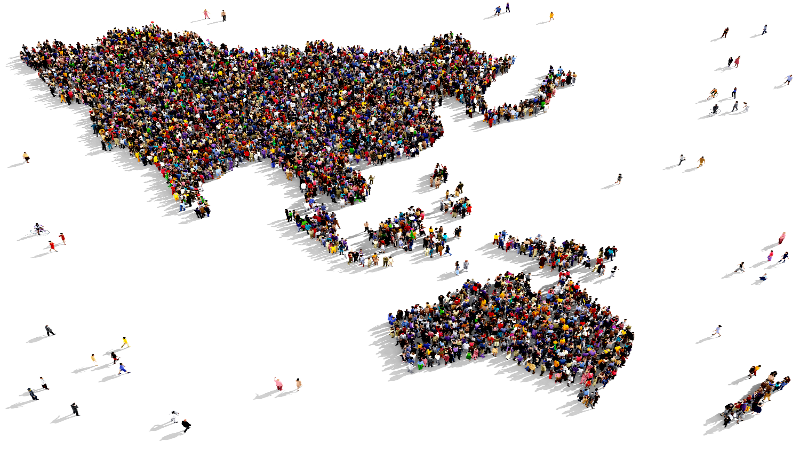Australia-China monthly wrap-up: October 2022
November 17 2022

By Elena Collinson and Corey Lee Bell
In October the Albanese government continued to strengthen regional ties and security cooperation with friends and partners without further inflaming tensions with the People’s Republic of China (PRC). Its ‘quiet diplomacy’ on security issues became even quieter in some respects this month, with senior Australian government ministers refraining from explicitly mentioning the PRC in discussions on national and regional security. At the same time, the government added new dimensions to its defence cooperation in the region, including agreeing to house up to six US Air Force B-52 strategic bombers at Tindal air base near Darwin, and signing an updated Joint Declaration on Security Cooperation with Japan. The response from Beijing was prompt but relatively muted.
During this month Australia hosted the Indian External Affairs Minister and leaders from Singapore, Japan and the Solomon Islands. Foreign Minister Penny Wong and Defence Minister Richard Marles made a number of trips to Pacific Island nations and Trade Minister Don Farrell visited Japan and South Korea. Defence Minister Marles also met his US and Japanese counterparts in Hawaii for the United States-Japan-Australia Trilateral Defence Ministers' Meeting, where he noted, in his opening remarks, that the alliance is ‘central to our world view’. During a press conference with US Secretary of Defense Lloyd Austin, Mr Marles said ‘at the heart of today's meeting, is really a sense of there being a strategic alignment between the United States and Australia, which has always been there but has never been greater than it is right now.’ He said that with the PRC seeking to ‘shape the world around us in a way that we have not seen before’, and that it is ‘fundamentally important that like-minded countries are working together’ to uphold the ‘rules-based order’.
In this year’s federal budget, presented on October 25, defence spending held steady at 1.96 percent of GDP.[1] The Defence Minister had stated on October 2 that ‘defence funding will rise to over two percent of GDP over the forward estimates’. An increase in aid of $1.4 billion over four years was also announced, with $900 million for Pacific nations and $470 million for Southeast Asian countries.
Warmer rhetoric from PRC representatives in Australia also continued in October. The PRC Consul General in Brisbane, Ruan Zongze, penned an opinion piece about ‘the improvement of China-Australia relations’ for the Chinese-language edition of the Global Times on October 21, describing positively the resumption of high-level political exchange between Canberra and Beijing, the economic complementarity between the two countries, and the ‘strong and resilient’ people-to-people foundations of the relationship, highlighting Australian multiculturalism. He also wrote, ‘The current progress in China-Australia relations is an encouraging start’. He repeated similar sentiments in a piece for the Courier Mail which was published a week later.
Matters to watch out for and which will have an impact on the Australia-PRC relationship moving forward include the new US export controls on semiconductor technology, and remarks by PRC President Xi Jinping and American officials on Taiwan.
The Biden administration’s limits on the sale of semiconductor technology to the PRC evinces a growing securitisation of dimensions of US-PRC trade that could place compliance pressures on the former’s allies.[2] Former Australian prime minister Kevin Rudd told an audience at an Asia Society event that ‘The administration worked on this for six to12 months trying to get the allies on board, which didn’t work entirely well because none of them did. So they’ve done it unilaterally in the expectation they can leverage the allies on board from this point on.’ With the PRC remaining Australia’s largest trading partner, this may well, in proceeding months, intensify debate on conflicts between Australia’s economic needs and security imperatives.
On Taiwan, President Xi in remarks to the 20th National Party Congress said, ‘[W]e will never promise to renounce the use of force, and we reserve the option of taking all measures necessary. This is directed solely at interference by outside forces and the few separatists seeking ‘Taiwan independence’’. The US is anticipating more urgent action to be taken by Beijing, with US Secretary of State Antony Blinken saying that Beijing was ‘determined to pursue reunification on a much faster timeline’ and Chief of US naval operations, Admiral Mike Gilday, putting forward the possibility that the PRC could take action on Taiwan this year: ‘When we talk about the 2027 window … that has to be a 2022 window or potentially a 2023 window’.
20th National Party Congress
October saw President Jinping further consolidate his political power domestically. The 20th National Party Congress of the Communist Party of China held on October 16-22 saw President Xi secure a third term in office, the first leader to do so since Deng Xiaoping, who held office from 1978 to 1989. (See also discussion over the removal of Hu Jintao from the final session of the party congress). He used his nearly two-hour speech to make a pledge to ‘build up security capacity in key areas’, as well as ‘consolidate our leading position in industries where we excel, work faster to shore up weaknesses in sectors vital to China's development security, and improve our capacity for securing the supply of strategic resources’.
Asked what a new term involving Xi would mean for Australia’s foreign policy, Foreign Minister Wong said, ‘Our strategic policy settings have not changed.’
B-52 strategic bombers at Tindal air base
On October 31, the ABC’s Four Corners reported the US was funding an upgrade of the Tindal air force base south of Darwin to house six American B-52 ‘Stratofortress’ strategic bombers by 2026. Australia’s Department of Defence confirmed the project, but sought to downplay it, pointing to past precedent of similar types of Australia-US military cooperation. A US Air Force representative told Four Corners that:
The ability to deploy US Air Force bombers to Australia sends a strong message to adversaries about our ability to project lethal air power ... the RAAF’s ability to host USAF bombers, as well as train alongside them, demonstrates how integrated our two air forces are.
Senior Australian ministers refrained from directly commenting on the planned deployment this month, leaving media rounds to junior ministers. Prime Minister Anthony Albanese sidestepped a question on the matter, and there was silence from Defence Minister Richard Marles. Minister for Defence Personnel Matt Keogh described the arrangement as focused on ‘building interoperability‘ and a ‘demonstration of our very close relationship’ with the US. Opposition Leader Peter Dutton was vocal in his support.
A PRC Ministry of Foreign Affairs spokesperson responded to the news of the development by saying the move ‘escalates regional tensions,’ ‘seriously damages peace and stability in the region,’ and ‘may trigger an arms race.’
Relations with India, Singapore and Japan
On October 10, Indian Minister of External Affairs Subrahmanyam Jaishankar visited Australia for the 13th Foreign Ministers’ Framework Dialogue. It was his second visit this year, having attended the Quad Foreign Ministers’ Meeting in Melbourne in February. In a media release on the visit, Foreign Minister Wong said that ‘our partnership with India is a critical part of shaping the region we want.’
During his visit, the opening of an Australian consulate in Bengaluru in 2023, as well as a new Indian consulate in Australia, was announced, and it was indicated that the Economic Cooperation and Trade Agreement between the two countries was ‘moving towards its ratification and entry into force’. In a reference to the Australia-PRC relationship, External Affairs Minister Jaishankar emphasised that:
Shutting down talking, burning bridges ... I would not recommend it. At the end of the day, countries have to deal with each other and you have to find some way of keeping that going.
Singaporean Prime Minister Lee Hsien Loong visited Australia on October 16-18 to attend the seventh Australia-Singapore Annual Leaders’ Meeting. He sidestepped a question on the state of Australia-China relations during a press conference with Prime Minister Anthony Albanese, saying, ‘We never give ourselves report cards, much less our friends.’ He did, however, offer a view on the recent US decision to curb the supply of advanced chips to China:
[D]ecoupling is a worry. National security concerns are real. … But we do worry that valid national security considerations may trigger further consequences and may result in less economic cooperation, less interdependency, less trust and, possibly, ultimately a less stable world.
Japanese Prime Minister Fumio Kishida visited Australia on October 21-23. During the trip he signed an updated Joint Declaration on Security Cooperation (first signed in 2007 by John Howard and Abe Shinzo) which will ‘expand and deepen practical cooperation and further enhance interoperability between the Australian Defence Force and the Japan Self-Defense Forces’. The agreement will allow Japanese troops to train with Australian soldiers in northern Australia. Japan and Australia also signed a new Critical Minerals Partnership to ‘develop Australia’s domestic sector and make sure Japan’s advanced manufacturers have the critical minerals they need.’
On October 24, PRC Foreign Ministry spokesperson said of the updated joint declaration, ‘The Asia-Pacific region does not need military blocs, still less groupings that could provoke bloc confrontation or stoke a new Cold War.’
The PRC and the Pacific
Solomon Islands Prime Minister Manasseh Sogavare visited Australia on October 6. He told press that the Solomon Islands ‘will never be used for foreign military installations or institutions of a foreign countries’.
The following week, Foreign Minister Wong travelled to the Marshall Islands and Nauru, with visits to the Cook Islands, Niue and French Polynesia the week after – bringing the number of Pacific countries visited to 12 since taking office in May. While in French Polynesia, the Foreign Minister opened an Australian consulate in Papeete. In a speech to the Pacific Way Conference she said, ‘This now makes Australia the only country in the world with a diplomatic presence in every Pacific Islands Forum member country or territory. There is no clearer demonstration of Australia’s commitment to the Pacific as a whole.’
On October 18, Senator Wong announced the appointment of a Special Representative for the development of the Greater Sunrise gas fields Timor-Leste, a project that Timor-Leste President José Ramos-Horta had described as ‘a national strategic goal.’ President Ramos-Horta had noted the PRC’s ‘interest’ in the project if an agreement on the joint venture were not to be reached by Timor Gap, Osaka Gas and Woodside.
Defence Minister Marles also visited Nauru at the beginning of the month to meet with newly elected President Russ Kun. He also travelled to Papua New Guinea on October 12-14 to meet with Prime Minister James Marape and other senior government ministers. on October 17-21 Mr Marles travelled to Tonga, where he attended the South Pacific Defence Ministers’ Meeting, and Fiji. On October 20, the Defence Minister and his Fijian counterpart signed a Status of Forces Agreement between Fiji and Australia.
In contrast to subtle references in recent months to ‘strategic competition’ as a factor influencing Australia’s diplomacy with Pacific Island countries, Australian ministers further downplayed notions that Canberra’s outreach to the Pacific was being shaped by an adversarial relationship with Beijing. On October 13, the Defence Minister said, ‘I actually wouldn't say that’ when asked if the PRC’s ‘expanding interest’ in the Pacific was a ‘main driver’ of the government’s attempts to establish Australia as ‘the partner of choice’ for Pacific Island nations. He added that while ‘there's no doubt that China forms part of [a challenging and complex strategic landscape]’, Australia needs to be ‘thinking about building our relationship with the Pacific on our own terms… and making sure that in doing that we're not focused on other countries’.
The Australia-PRC economic relationship
On October 11, Trade Minister Farrell said that the PRC Ambassador to Australia had signalled that Beijing was ‘prepared to have… discussions [on trade issues]’. He added, ‘My job now is to convince China to change its view. There’s been a couple of positive signs.’ He repeated the message that he had been pressing over the last few months that ‘I don't think we ever want to get into a situation where we again are so reliant on China as a source of our exports.’
Trade diversification
The Trade Minister travelled to Japan and South Korea to ‘explore the significant potential to grow and diversify trade and investment in the agribusiness, education, renewable energy and critical minerals sectors.’ Rock lobster and wine were a focus.
One rock lobster fisherman in South Australia told the ABC, ‘Until we can get in the front door of China again we’re going to struggle. The domestic market doesn’t hold up – they just can’t take the quantity that comes in.’ In Western Australia, a fisherman’s cooperative representative said, ‘We would certainly welcome China back with open arms’.
Comprehensive and Progressive Agreement for Trans-Pacific Partnership
The Trade Minister at the beginning of the month repeated Australia’s position on the PRC’s accession to the Comprehensive and Progressive Agreement for Trans-Pacific Partnership (CPTPP):
To join [the] CPTPP, aspirant economies need to meet CPTPP’s high standards and rules, and have a demonstrated track record of compliance with trade commitments. When it comes to trade, actions speak louder than words.
During a visit to Australia, Singaporean Prime Minister Lee told a press conference on October 18, ‘I think it is good if China is able to join the CPTPP,’ while noting ‘I don't think there is a consensus yet but we will continue that process.’ He said of Australia position, ‘I think Australia knows what it is doing and we understand each other's point of view.’
Xinjiang
On October 6, the UN Human Rights Council (UNHRC) rejected a draft resolution to hold a ‘debate on the situation of human rights in the Xinjiang Uyghur Autonomous Region, China’. Seventeen countries, including Australia, had voted in favour, while 19 voted against and 11 abstained.
The next day the PRC Foreign Ministry denied that human rights violations had occurred in Xinjiang, describing the UNHRC draft decision as ‘a tool’ to ‘serve the agenda of using Xinjiang to contain China.’
Former defence personnel working for the People’s Liberation Army
This month saw the British government release a statement that it would be taking steps to prevent former UK military pilots working for the PRC military. This came in the wake of claims that up to 30 such former pilots had been recruited to train members of the People’s Liberation Army. The revelations prompted the Australian government to investigate whether similar recruitment efforts were occurring with Australian military personnel. Defence Minister Marles directed the Department of Defence ‘to come back to me as quickly as possible with a report about whether this is an issue which presents a material danger to Australia or not.’
Opposition Leader Dutton labelled the reports ‘alarming’ and called on the government ‘to introduce legislation to deal with this issue’ as ‘we can't allow our secrets and our methodologies to be handed over to another country and particularly not China under President Xi.’
Elena Collinson is a senior researcher at the Australia-China Relations Institute, the University of Technology Sydney.
Dr Corey Lee Bell is a Project and Research Officer at the Australia-China Relations Institute, University of Technology Sydney (UTS:ACRI).
Notes
[1] Any increase will likely be held off until next year following the handing down of the reports of the Defence Strategic Review and the Nuclear Submarine Taskforce.
[2] The Washington Post reported on October 27 that the US Commerce Department Undersecretary for Industry and Security Alan Estevez said Washington was ‘close’ to getting allies to join the restrictions. See Jeanne Whalen, ‘expect more China-related tech crackdowns, US official says’, The Washington Post, October 27 2022 <https://www.washingtonpost.com/technology/2022/10/27/expect-more-china-related-tech-crackdowns-us-official-says/>.


